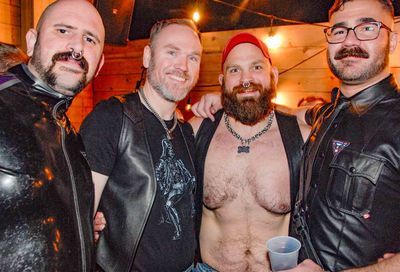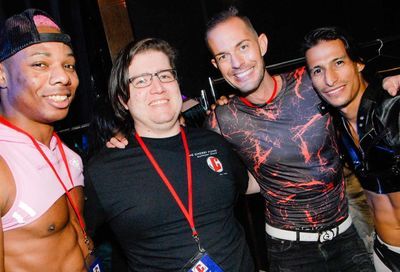ENDAgate
Commentary: A Town Square Opinion
The principle is simple: Transgenders are human beings who have a right to equal justice under the law. The question — and it is a contentious one — is how to achieve that equality. I am sorry to have to say this, but I think it is irresponsible and counterproductive for GLBT activist groups to demand that Congress vote against the Employment Non-Discrimination Act (ENDA) unless we can pass everything we want at once.
I have a bit of explaining to do, since I pushed the Gay and Lesbian Activists Alliance (GLAA) to sign onto an Oct. 1 joint letter opposing passage of ENDA without transgender protections. GLAA strongly supports transgender equality, so we joined the nationwide groundswell for an inclusive bill. We issued an action alert and posted links on our Web site to a variety of resources.
Tactically, while we were still hoping to win enough votes for a transgender-inclusive bill, it made no sense to signal that we’d settle for less. That would have undermined our advocacy. But the House leadership has determined that the votes to include gender identity are still not there, and is moving ahead with Rep. Barney Frank’s (D-Ma.) gay-only version, while promising to hold a floor vote on a trans-inclusive ENDA as soon as advocates have the votes. We need to ask whether it really makes sense to put ideological purity ahead of pragmatism by preferring no bill at all to an imperfect bill after pushing for federal non-discrimination protections on sexual orientation for 33 years.
In a Sept. 28 statement on ENDA, Frank maintained ”the value of getting people used to voting for this, of the moral force of having majorities in either the House or the Senate or both go on record favorably even if the president was going to veto it….
”Even from the standpoint of ultimately including transgender people, it makes far more sense to go forward in a partial way if that is all we can do. Part of the objection to any antidiscrimination legislation is fear of consequences, which fears are always proven to be incorrect. There is a good deal of opposition now to passing even sexual orientation legislation. Enacting legislation to ban discrimination based on sexual orientation and getting a year or two’s experience with it, will be very helpful in our ultimately adding to it protection for people who are transgender.”
After mulling the question for over a week, I was swayed by gay rights pioneer Frank Kameny. He says that incrementalism has been the hallmark of our extraordinarily successful movement, that ideological rigidity gets us nowhere, that indeed each partial victory paves the way for the next. He says that Barney Frank is right.
An interesting part of the ENDA dispute involves legal analysis. In an exchange with Rep. Frank, Lambda Legal has insisted that a gay-only version of ENDA would enable employers to discriminate by saying they were troubled not by someone’s homosexuality per se, but by her gender nonconformity. This is disputed by University of Minnesota law professor Dale Carpenter, who writes at Volokh.com: ”[W]e now have decades of experience with state laws that protect gay people from discrimination based on sexual orientation but not gender identity. If the inadequacy of sexual-orientation protections were a real problem — as opposed to a hypothetical or theoretical one — we should expect to see many such cases. But neither Lambda nor any other organization has yet produced a single instance in which an employer successfully argued around a gay-only employment protection law by claiming that it really fired the person for gender non-conformity.”
On Huffington Post on Oct. 4, Gabriel Rotello discussed the commonalities between transphobia and homophobia: ”Whether we face prejudice for being too butch or too femme, or for being cross-dressers or androgynes, or for simply being perceived as gay or lesbian, we are all ultimately disliked for the same basic reason: Transgressing our expected gender roles.”
I think this is true, though it does not yield a legislative strategy. He also says that ”in a very real sense, all gay people are transgendered.” That’s fine, but only in a sense. As with most people, my gender identity matches my biological sex, and I see no reason to let oppressive gender norms dictate our categories. ”Gay” and ”male” may seem contradictory to some traditionalists, but my whole activist career has been a challenge to them. Nor can I accept Rotello’s suggestion that we stop being the GLBT movement ”and simply become the trans movement.” Asking me to erase my own firmly held identity is hardly a way to strengthen the coalition.
We need to remember that diversity is not just a slogan but a messy reality. Like it or not, the Human Rights Campaign (whose Hamlet-like equivocation on the matter frustrated many activists) has its constituency, as do the hundreds of groups that signed the joint letter coordinated by the National Gay and Lesbian Task Force. As GLAA President Barrett Brick says, ”Disagreements over strategy are not moral failings.” I would add that internecine warfare among GLBT activists does not change a single vote. HRC President Joe Solmonese made a key point on Oct. 5: ”No matter how difficult it is to come under fire…we know that turning our backs on our relationships with Congress is not an acceptable strategy for HRC.”
The misdirected anger over this issue has reached the point of silliness. Notorious homo-hater Peter LaBarbera’s inaptly named Americans for Truth Web site uses a quote he attributes to Rep. Frank from some unspecified time in the past, asserting the impossibility of getting Congress to pass a provision ”for people with penises who identify as women to be able to shower with other women.” Given that respecting people’s self-identification as male or female is basic to the transgender cause, such a statement is extremely insensitive. A search of the Internet traces every instance of the quote to LaBarbera, raising questions about its authenticity. Yet some transgender activists take LaBarbera at his word, calling Frank a bigot and ignoring the pro-transgender statements issued by Frank’s office. People who are so eager to believe the worst that they trust Peter LaBarbera ahead of Barney Frank should ask themselves if they are more committed to collecting grievances than to advancing legislative goals.
To be sure, the concern over bathrooms and showers is exaggerated. I once stood in the men’s room during a Mautner Project dinner, doing my best impression of Robert Mapplethorpe’s ”Man in Polyester Suit,” when a dozen lesbians dressed to the nines paraded past me. I didn’t mind if they didn’t mind. But many Americans do mind. Assuaging their irrational fears requires educating them, not shooting the messenger. As it happens, the National Center for Transgender Equality offers a simple solution in a flyer titled Making Shelters Safe for Transgender Evacuees: ”It may be necessary to add a stall door or shower curtain to address valid privacy and safety concerns.” Wouldn’t it be more productive to explain this to people than to cry ”transphobia!” at every opportunity?
Having said that, it is important to keep in mind the real people we are talking about. Imagine being on the receiving end of slurs like Rush Limbaugh’s crude mockery regarding sex-reassignment surgery during his Oct. 4 radio broadcast. Imagine being at high risk for joblessness, homelessness and hate crimes. When people who don’t conform to popular notions of gender-appropriate expression are treated as if they don’t exist, it makes no sense to leave them legally unprotected. But that’s just it: The recent victory of a trans-inclusive hate crime bill in the Senate shows that we are not talking about abandoning transgenders (though a few voices do talk that way). This is a disagreement over strategy.
By way of fairness, I must comment on an Oct. 3 blog entry by John Aravosis, in which he says that many in the gay rank and file privately ask ”when [it was that] transgendered people became part of the gay community?” As historian Susan Stryker notes in an article published on UnitedENDA.org, trans people were involved in civil-rights activism beginning years before Stonewall, in incidents from the sit-in at Dewey’s Lunch Counter in Philadelphia in April-May 1965 to the riot at Compton’s Cafeteria in San Francisco’s Tenderloin neighborhood in August 1966. If facile cries of betrayal are counterproductive, so is questioning people’s movement credentials or assuming that trans activism is new merely because, in Prospero’s words, ’tis new to thee.
The problem facing us is a pragmatic one. As then-Senate Majority Leader Lyndon Johnson told NAACP lobbyist Clarence Mitchell during one of the civil-rights battles of the 1950s, ”Clarence, you can get anything you want if you have the votes. How many votes have you got?” A few weeks of intensive lobbying are great, but cannot establish the deep roots that only a sustained long-term effort can do. In the meantime, there is nothing progressive about decrying the prospect of an historic breakthrough that the House’s passage of even an imperfect ENDA would represent.
It is because sexual orientation and gender identity are interwoven that gay people and transgenders make natural allies, even if we work one another’s last nerve. Regardless of the strategic choices on a particular bill, we cannot ”throw Tranny from the train.” She will remain a part of us. The more we absorb this, the more convincing our lobbying efforts will be, and the more our mutual trust will grow. Strong relationships take time — both in legislatures and within our contentious GLBT family. As Nietzsche wrote in Ecce Homo, ”What does not kill him, makes him stronger.” And her.
Richard J. Rosendall can be reached at rrosendall@starpower.net.
Support Metro Weekly’s Journalism
These are challenging times for news organizations. And yet it’s crucial we stay active and provide vital resources and information to both our local readers and the world. So won’t you please take a moment and consider supporting Metro Weekly with a membership? For as little as $5 a month, you can help ensure Metro Weekly magazine and MetroWeekly.com remain free, viable resources as we provide the best, most diverse, culturally-resonant LGBTQ coverage in both the D.C. region and around the world. Memberships come with exclusive perks and discounts, your own personal digital delivery of each week’s magazine (and an archive), access to our Member's Lounge when it launches this fall, and exclusive members-only items like Metro Weekly Membership Mugs and Tote Bags! Check out all our membership levels here and please join us today!




















